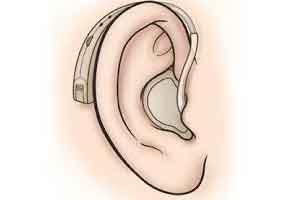- Home
- Editorial
- News
- Practice Guidelines
- Anesthesiology Guidelines
- Cancer Guidelines
- Cardiac Sciences Guidelines
- Critical Care Guidelines
- Dentistry Guidelines
- Dermatology Guidelines
- Diabetes and Endo Guidelines
- Diagnostics Guidelines
- ENT Guidelines
- Featured Practice Guidelines
- Gastroenterology Guidelines
- Geriatrics Guidelines
- Medicine Guidelines
- Nephrology Guidelines
- Neurosciences Guidelines
- Obs and Gynae Guidelines
- Ophthalmology Guidelines
- Orthopaedics Guidelines
- Paediatrics Guidelines
- Psychiatry Guidelines
- Pulmonology Guidelines
- Radiology Guidelines
- Surgery Guidelines
- Urology Guidelines
Cognitive Function in Elderly improves with Hearing Aids

New York : A team of US researchers, including an Indian-origin scientist, has found that older adults who used a hearing aid performed significantly better on cognitive tests than those who did not use a hearing aid despite having poorer hearing.
The findings showed that hearing aids can keep older adults with hearing loss more socially engaged, prevent the development of dementia as well as slow down the effects of ageing on cognitive function.
In contrast, elderly people who are hearing impaired and do not use a hearing aid are at an increased risk of sensory-specific decline in mental skills.
"We know that hearing aids can keep older adults with hearing loss more socially engaged by providing an important bridge to the outside world," said Anil Lalwani, professor and otolaryngologist at Columbia University Medical Center (CUMC) in the US.
In the study, published online in the American Journal of Geriatric Psychiatry, the researchers wanted to determine if they could also slow the effects of ageing on cognitive function.
The team included 100 adults with hearing loss between the ages of 80 and 99. Of the participants, 34 regularly used a hearing aid. Audiometry tests were performed to measure the degree of hearing loss. Cognitive and executive functions of the participants were also assessed.
"Our study suggests that using a hearing aid may offer a simple, yet important, way to prevent or slow the development of dementia by keeping adults with hearing loss engaged in conversation and communication," Lalwani explained.

Disclaimer: This site is primarily intended for healthcare professionals. Any content/information on this website does not replace the advice of medical and/or health professionals and should not be construed as medical/diagnostic advice/endorsement or prescription. Use of this site is subject to our terms of use, privacy policy, advertisement policy. © 2020 Minerva Medical Treatment Pvt Ltd